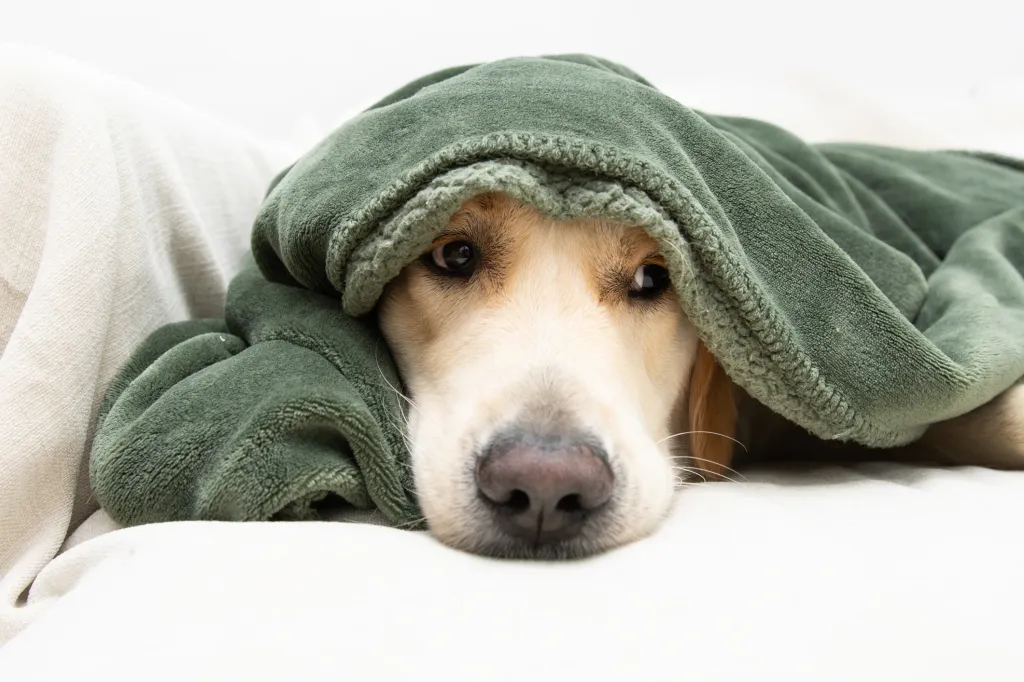Table of Contents
Key Takeaways
- Sneezing, eye and nose discharge, fatigue, and coughing are signs of a respiratory tract issue.
- Most infections are mild and last seven to 21 days for dogs and cats.
- Hydration, rest, and certain foods can help your pet get over a respiratory infection.
- Consult a vet about serious respiratory infections so they don’t lead to pneumonia.
Kennel cough and upper respiratory infections are common in pets, especially during winter months, and especially among kittens and puppies. While some colds can be resolved with at-home treatment, some may require medical care, so be certain you don’t need to take your kitty or pup into the vet (and when in doubt, bring them in to be safe).
Signs and symptoms of upper respiratory infection
The respiratory tract infection can be caused by a virus, such as canine influenza, or bacterial, such as kennel cough. Signs of a respiratory tract infection include:
- Sneezing
- Discharge from the nose and eyes
- Decreased appetite
- Fatigue
- Coughing
Most upper respiratory infection cases in dogs and cats tend to be mild and will usually last about 7 to 21 days. If your pet shows signs of difficulty breathing, lethargy, and refusing to eat, or if they do not show improvement after 2-3 weeks of symptoms, the illness could be a more serious case, and you should seek veterinary attention.
Treating upper respiratory infection in dogs and cats
There are a variety of at-home treatments for a pet suffering from an upper respiratory infection, many of which are all-natural and environmentally-friendly. Creating a soothing, healthy space for your pet to heal is one of the easiest steps you can take to help fight a cold. Check out these easy treatments you can do from home.
- Steam it up.
Increasing the humidity can help your dog or cat breathe easier, just as it does for humans! Using a humidifier in your pet’s favorite hangout has a ton of benefits: fur is less staticky, asthma conditions can be mitigated, and breathing passageways are soothed. Word of caution: beware of burns when using warm-mist humidifiers around pets as well as children. If you don’t own a humidifier, just take your pet into the bathroom when you take a shower. They breathe the steam as you get clean and by the time you are done, the treatment is over! - Feed a cold.
When pets have a stuffy nose, their sense of smell is dulled. You can heat up wet food in the microwave for 10 seconds to make it smellier, shred some rotisserie chicken, scoop out canned tuna, and if all else fails, warm low sodium chicken or beef broth. Food is fuel for the body cells as well as the immune system and dogs and cats need it to beat the upper respiratory infection. - Wipe runny noses.
Even dogs and cats get the sniffles! If you notice nasal discharge, use a moist towel to wipe delicate noses. Soothing grooming wipes or scent-free baby wipes are available at pet supply stores. - Keep your pet hydrated.
Set out plenty of fresh water. Picky cats and dogs may prefer running water; invest in a cat fountain or be attentive to faucets. Quick tip on making sure pets get more water: add a little low sodium chicken broth to the bowl (and then make sure to clean and wash the bowl thoroughly 24 hours after the addition). - Rest, rest and more rest.
Let your pet sleep it off in a favorite spot. Provide extra blankets or pillows for added comfort, and make sure your home is a comfortable temperature. While it’s okay for sick pets to take a rest, make sure to ease your pet back into exercise after they’ve recovered. - Bundle them up.
Depending on where you live in the country, it may be cool outside, cold outside or get cold at night. If your cat has an upper respiratory infection, keep them inside where it’s warm. If your dog has an upper respiratory infection, make sure you wrap them in a warm doggie jacket before they go outside to potty.
For more serious respiratory infections that can afflict kittens and puppies, you want to consult a veterinarian. For example, upper respiratory infections in kittens or puppies, elderly pets or pets with compromised immune systems are more likely to lead to pneumonia. Follow the above tips in addition to proper medical attention and care. Consider covering your pup with dog medical insurance to help cover the costs of unexpected veterinary care.
The content is not intended to be a substitute for professional veterinarian advice, diagnosis, or treatment. Always seek the advice of your veterinarian or other qualified health provider with any questions you may have regarding a medical diagnosis, condition, or treatment options.








